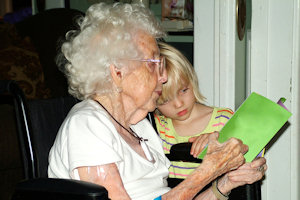Kinship placement is a growing priority in foster care throughout the U.S.
When a child can no longer live with his or her birth parents, the state prefers placing the child in the home of a relative or friend instead of a non-relative foster home. This, ideally, will ease the trauma of separation from birth parents while providing a safe environment for the child to live in. It’s a shift in foster care that, according to supporters, has obvious benefits. Continue readingThe History of Orphanages
 The word orphanage often conjures up images of raggedy Oliver Twist and Annie in destitute surroundings with scores of poor children, but the institution holds a vital place in the history of caring for foster children dating back to the late 19th century.
The word orphanage often conjures up images of raggedy Oliver Twist and Annie in destitute surroundings with scores of poor children, but the institution holds a vital place in the history of caring for foster children dating back to the late 19th century.
During a time when few options existed, orphanages housed and cared for children who were abandoned or whose parents were temporarily unable to care for them. Continue reading
The DCP&P Adoption Registry – A History
To access closed adoption birth records or to not access closed adoption birth records. That has certainly been a question for many decades among those it affects the most – adoptees, the families that have adopted them and  birth parents. There has been a divide of opinion on this topic to say the least. On one hand, birth parents that have decided they want to keep their identity a secret have most likely done so because they wanted protection. Continue reading
birth parents. There has been a divide of opinion on this topic to say the least. On one hand, birth parents that have decided they want to keep their identity a secret have most likely done so because they wanted protection. Continue reading
The New Jersey Tuition Waiver: A History
The New Jersey Tuition Waiver – Advocating for Education for Children in Foster Care
At a time when only a handful of states provided tuition coverage to eligible children in foster care, Foster and Adoptive Family Services (FAFS) stepped to the plate and went to bat for the children in care in New Jersey. At the time, FAFS knew how important it was to bring the tuition waiver to the state. FAFS and its Board of Directors knew getting a Tuition Waiver Bill written and to the governor to sign into law would be a huge undertaking – especially considering the work load of the staff and the various offerings that were being provided to the foster care community through the organization.
 However, FAFS also knew that this legislation would make a world of difference in the lives of children in care – especially to the older youth making the transition into adulthood. FAFS believed the state providing financial support in education would send a clear message that children in care are just as important as any other child, and they can succeed. A legislative committee spearheaded by then FAFS president, Janet Farrand, began to take steps in passing the New Jersey Tuition Waiver Bill in law. Continue reading
However, FAFS also knew that this legislation would make a world of difference in the lives of children in care – especially to the older youth making the transition into adulthood. FAFS believed the state providing financial support in education would send a clear message that children in care are just as important as any other child, and they can succeed. A legislative committee spearheaded by then FAFS president, Janet Farrand, began to take steps in passing the New Jersey Tuition Waiver Bill in law. Continue reading
A Former Foster Child’s Recollection of Hattie Talley
We meet thousands of people in a lifetime with many of them disappearing in the annals of memory. But every so often there’s one person you come across, whether it’s for seven minutes or seven years, that changes your life forever.

Hattie Talley, Founder New Jersey Foster Parent Association (now known as Foster and Adoptive Family Services)
That’s what Hattie Talley, co-founder of Foster and Adoptive Family Services (FAFS), was for Susan Roseboro.
After becoming a foster child in 1966 at age 13 following her parent’s divorce, Roseboro spent time in four foster homes, each leaving little impression and less connection.
The fifth home, however, changed everything. Continue reading

